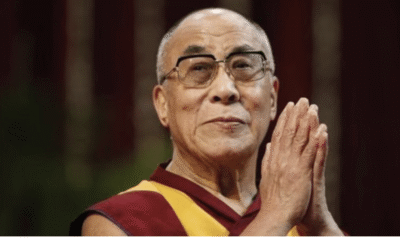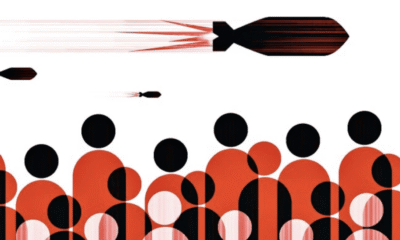
|
Getting your Trinity Audio player ready...
|
(The article was originally published by Indian Express on December 31, 2022 as a part of Dr Madhav’s bi-weekly column titled ‘Ram Rajya’. Views expressed are personal.)
In September 2014, in his first meeting with President Barack Obama, Prime Minister Narendra Modi talked about making the US a principal partner “in the realisation of India’s rise as a responsible, influential world power”. This was in a way the first time that any Indian prime minister had talked about the country’s ambition to grow into a “responsible, influential world power”. That ambition manifested in the functioning of the Modi government in the last eight years. From wars to the economy to climate, India has become integral to the contemporary global discourse.
India is not new to playing a proactive role in world politics. Right from Independence, India’s leadership had actively pursued an agenda that favoured the interests of developing or less developed countries. Whether it was the GATT negotiations or the Non-Proliferation Treaty, India took a principled stand and stood up to the policy domination of the developed world. India’s role as the protector of the interests of the developing world during WTO negotiations has been significant. Murasoli Maran, as the Minister of Commerce in the Vajpayee government, played a very critical role in preventing developed countries from pushing through their trade and commercial agendas. The UPA government continued that approach, inviting opprobrium and occasional isolation from the interested players. However, that didn’t deter India from opposing agendas that were seen as against the interests of not only its people but also the larger developing world.
India’s significant contribution in all these fora was that it added a moral dimension to the developed world’s monetary vision. However, India, in the process, acquired the image of being a nay-sayer and obstructionist.
PM Modi affected a shift in this approach. While standing up for the developing world and zealously upholding its strategic autonomy, India started playing a proactive role in finding solutions. The Paris Climate Summit in 2015 provided the first major opportunity for India to highlight its new priorities. It played a pivotal role in clinching the climate deal while ensuring that the interests of the developing world are not compromised. PM Modi cogently articulated this stand in an article in the Financial Times on the eve of the Summit: “Justice demands that, with what little carbon we can safely burn, developing countries are allowed to grow. The lifestyles of a few must not crowd out opportunities for the many still on the first steps of the development ladder.” India’s efforts resulted in developed countries agreeing to the principle of “common and differentiated responsibility”. India also convinced developed countries to agree to the formulation of not externally imposed targets but “intended nationally determined contributions” or INDCs.
India’s arrival on the global stage as an important player was further augmented by its constructive response during the Covid pandemic. Besides undertaking the massive exercise of vaccinating its billion-plus citizens, India came to the rescue of more than 90 countries by ensuring a timely supply of vaccines through its “Vaccine Maitri” programme. As we enter the post-Covid world, India’s growing importance is conspicuous in many areas. Its post-Covid economic recovery has been commendable, with the World Bank even revising its projections for 2022 GDP growth from 6.5 per cent to 6.9 per cent. The IMF estimated it to be at 6.8 per cent while the rest of the world was projected to grow at 4.9 per cent.
The country is entering the new year on a buoyant note. The leadership of important multilateral bodies including the G20 and SCO has come into its hands. Its principled stand on the Russia-Ukraine war has won it laurels. The new year is thus going to provide India with the opportunity to fulfil its “world power” ambition that its leadership articulated in 2015.
While achieving that, India must not lose sight of the principles that it always championed: It must continue to act as the voice of the Global South. That means its diplomatic, strategic and political investments in its neighbourhood and Asia, Africa and Latin America must increase. With SAARC failing and BIMSTEC remaining a non-starter, India’s attention to the ASEAN and Indian Ocean neighbourhood must grow. Its Act East policy needs more teeth.
The India Africa Forum Summit (IAFS), started in 2008 as a triennial event by then Prime Minister Manmohan Singh, met for the third time in 2015 in Delhi. PM Modi took a special interest in cultivating stronger ties with African nations which led to the highest-ever participation in the Summit. It is important to revive the process. Similarly, India’s relations with countries in Latin America too need greater impetus.
At the Bali G20 Summit, India played a crucial role in ensuring that both Russia and its critics like the US had their say on the Russia-Ukraine war in a dignified way without being interrupted. On its part, India conveyed to the Russian leadership that it was not a time for war. The new year will bring an opportunity before India to play a role in ending the war. How deftly the Indian leadership handles that burden will determine its future status.
As G20 chair, India has the opportunity to set a new agenda before the world’s most powerful block of nations. In the past, it always worked for the judicious sharing of global public goods. It is time now to undertake similar efforts for global digital and genetic goods. The advent of artificial intelligence and genetic manipulation technologies is going to throw the world into turmoil. If not regulated globally on time, these technologies are going to play havoc with humanity’s future.
India always upheld moralism in global politics. In climate talks, too, the Indian side is resorting to traditional wisdom to achieve global good. India must bring that moralist dimension to new technological developments.
There are a couple of spoilers in India’s ambition to grow bigger on the world stage. Externally, China may try to curtail India’s ambitions by keeping the border tense. Domestically, the aggravation of religious and political fault lines for electoral or ideological reasons may jeopardise the leadership’s ability to rise in global stature.
Opportunities come with challenges. The year 2023 brings both for India. “Modi hai to mumkin hai” is needed now more than ever before.



